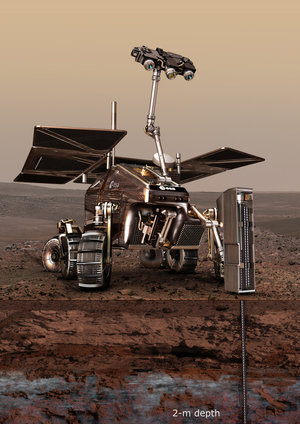Aurora student design competition finalists
Student teams from all over Europe and Canada have been flocking to enter the Aurora design competition since its inception in January. After careful evaluation by experts from the Aurora Programme and others with specific technological and scientific expertise, the 17 finalists of this exciting competition have now been selected.
The successful teams will go on to present their projects in Barcelona on 8-9 September, when the overall winners will be picked by a jury that will include members of the ESA/Aurora Exploratory Programme Advisory Committee (EPAC).
“ESA is always on the lookout for imaginative new ideas and concepts that could enhance Europe’s long-term plans for the robotic and human exploration of the solar system, and we believe that European universities can contribute much to this,” said the competition organiser, Piero Messina of the Aurora Programme Office.
“We are delighted at the response from the next generation of mission designers and engineers,” he added. “All of the projects are of an excellent standard and the panel would like to express its appreciation of the students’ work, effort and enthusiasm.”
Design entries were invited for five categories: Arrow and Flagship missions, Enabling Technologies, Surface Robotics and Human Missions. The three most impressive entries in each category were chosen by the panel of experts, with a further two from the Human Missions' section where competition was particularly fierce.
The finalists for each category are:
Arrow missions:
Helsinki University of Technology, Finland
McGill University, Montreal, Canada
Politecnico di Milano, Italy
Flagship missions:
Politecnico di Milano, Italy
Polytechnic University of Madrid, Spain
Royal Military College of Canada, Kingston, Ontario
Human missions:
Alpbach Summer School, Team 4 (the result of a two-week residential summer course organised by the Austrian Space Agency with the sponsorship of ESA)
Cranfield University, UK
International Space University, Strasbourg, France
Kingston University, UK
Politecnico di Milano, Italy
Enabling technologies:
Swiss Federal Institute of Technology, Lausanne, Switzerland
Universitat Politecnica de Catalunya, Spain
University of Technology, Graz, Austria
Surface robotics:
Politecnico di Milano, Italy
University of Leicester, UK/University of Hamburg, Germany
University of Limerick, Ireland
Over 60 preliminary design entries were received by March 2003, with 37 projects delivered by the deadline of July 30.
The first prize in each category is a 4-day trip to the European Space Research and Technology Centre (ESTEC) in the Netherlands. The visit will include a tour of the ESTEC facilities, with the possibility for teams to discuss their project with ESA experts.
The jury's special prize - a trip to Europe’s spaceport in Kourou, French Guiana - will be awarded to the overall winning team. The visit will include a tour around the impressive facilities of the launch centre and presentations by representatives of ESA and industry.









